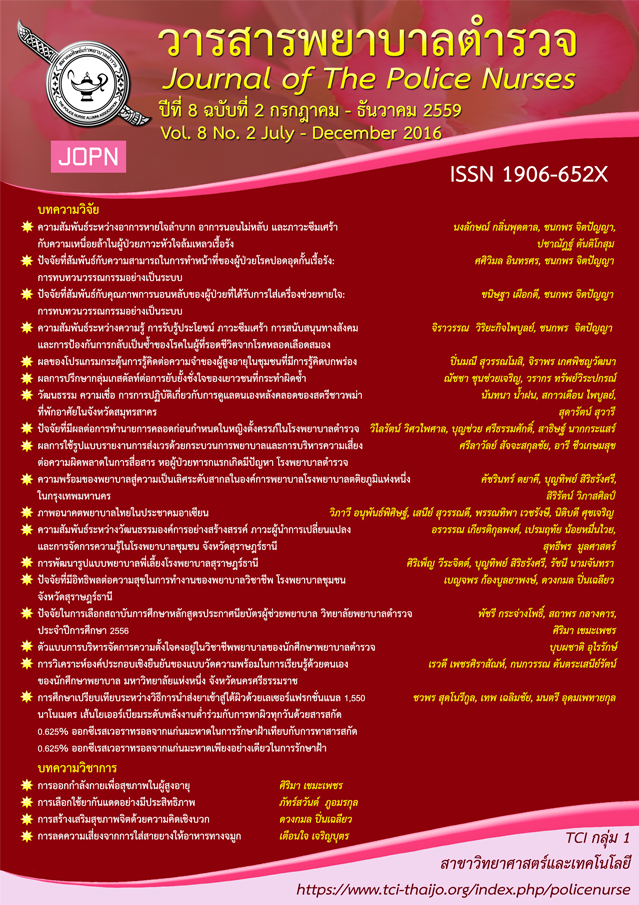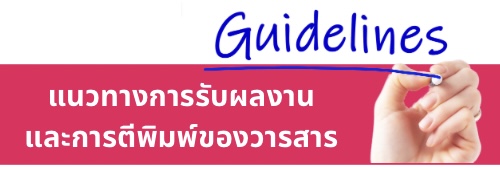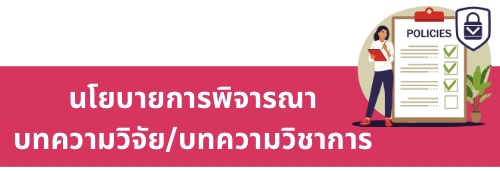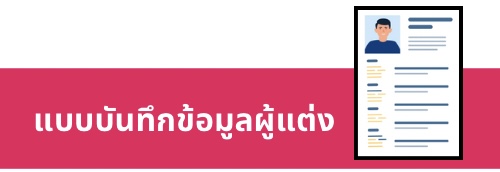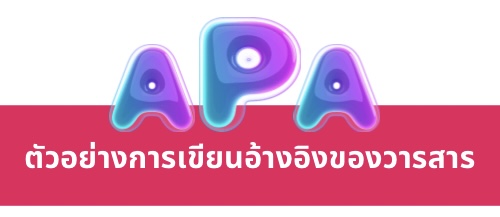การพัฒนารูปแบบพยาบาลพี่เลี้ยงโรงพยาบาลสุราษฎร์ธานี
คำสำคัญ:
รูปแบบพยาบาลพี่เลี้ยง, การพัฒนารูปแบบ, โรงพยาบาลสุราษฎร์ธานี, mentor model, model development, Suratthani Hospitalบทคัดย่อ
งานวิจัยครั้งนี้เป็นการวิจัยและพัฒนา มีวัตถุประสงค์เพื่อ 1) พัฒนารูปแบบพยาบาลพี่เลี้ยงให้เหมาะสมกับบริบทโรงพยาบาลสุราษฎร์ธานี 2) ประเมินความเหมาะสมของรูปแบบพยาบาลพี่เลี้ยง และ 3) ประเมินความพึงพอใจต่อการนำรูปแบบพยาบาลพี่เลี้ยงที่พัฒนาขึ้นไปใช้ในโรงพยาบาลสุราษฎร์ธานี ตัวอย่างหรือผู้ให้ข้อมูลได้รับการคัดเลือกแบบเฉพาะเจาะจง ประกอบด้วย 1) ผู้ทรงคุณวุฒิ 5 คน สำหรับประเมินความเหมาะสมของรูปแบบ 2) พยาบาลวิชาชีพที่ปฏิบัติงานอยู่ในโรงพยาบาลสุราษฎร์ธานี ประกอบด้วย พยาบาลจบใหม่ 12 คน พยาบาลพี่เลี้ยง 12 คน และหัวหน้าหอผู้ป่วย 6 คน สำหรับประเมินความพึงพอใจต่อการนำรูปแบบไปใช้ เครื่องมือการวิจัยมี 3 ชุดได้แก่ 1) รูปแบบพยาบาลพี่เลี้ยงที่พัฒนาโดย สุพรรณี พูนเพิ่มสุขสมบัติ 2) แบบประเมินความเหมาะสมของรูปแบบพยาบาลพี่เลี้ยงที่พัฒนาขึ้น และ 3) แบบประเมินความพึงพอใจต่อผลการนำรูปแบบพยาบาลพี่เลี้ยงที่พัฒนาขึ้นมาใช้ในโรงพยาบาลสุราษฎร์ธานี เครื่องมือผ่านการตรวจสอบความตรงจากผู้ทรงคุณวุฒิจำนวน 5 คน ได้ค่าดัชนีความตรงตามเนื้อหาเท่ากับ 1.0 วิเคราะห์ข้อมูลโดยใช้ค่าความถี่ ร้อยละ ค่าเฉลี่ย ส่วนเบี่ยงเบนมาตรฐาน และการวิเคราะห์เนื้อหา
ผลการวิจัย พบว่า 1) รูปแบบพยาบาลพี่เลี้ยงโรงพยาบาลสุราษฎร์ธานีที่พัฒนาขึ้น ประกอบด้วย 4 ส่วน ได้แก่ ก) วัตถุประสงค์ ข) ขั้นตอนการดำเนินงาน ค) แนวทางในการนำรูปแบบไปใช้ และ ง) แผนการปฏิบัติงานของพยาบาลพี่เลี้ยงและพยาบาลวิชาชีพจบใหม่ ซึ่งประกอบด้วย 3 ระยะ ได้แก่ ระยะการสร้างสัมพันธภาพ ระยะการแสดงบทบาทพยาบาลพี่เลี้ยง และระยะสิ้นสุดของการเป็นพยาบาลพี่เลี้ยง และ 2) รูปแบบพยาบาลพี่เลี้ยงโรงพยาบาลสุราษฎร์ธานีที่พัฒนาขึ้น มีความเหมาะสมกับบริบทโรงพยาบาลสุราษฎร์ธานีร้อยละ 90 และ 3) ตัวอย่างมีความพึงพอใจต่อการนำรูปแบบพยาบาลพี่เลี้ยงที่พัฒนาขึ้นไปใช้ ได้ค่าเฉลี่ยโดยอยู่ในระดับมาก (=4.40, S.D.=.563)
DEVELOPMENT OF A MENTOR MODEL FOR NURSES AT SURATTHANI HOSPITAL
Abstract
The purposes of this research and development were: 1) to develop an appropriate nursing mentor model with the context of Suratthani Hospital, 2) to evaluate the appropriation of the developed model, and 3) to evaluate the satisfaction of the model application in Surathani Hospital. The sample or key informants were selected by using purposive sampling technique, comprising 2 groups; 5 experts to evaluate the appropriation of the developed model, and professional nurses working in Suratthani Hospital which included 12 novices, 12 mentor nurses, and 6 head nurses for evaluation the satisfaction of the model application. Three parts of research tools were used as follows: 1) Nursing mentor model which was developed by Supannee Poonpermsuksombut, 2) The form to evaluate the appropriation of the developed nursing mentor model, and 3) the questionnaire for satisfaction evaluation to the developed model. The content validity was verified by 5 experts, and the CVI was 1.0. Data were analyzed by frequency, percentage, mean, standard deviation, and content analysis.
The research findings were as follows: 1) The developed nursing mentor model of Suratthani Hospital comprised four sections: a) objective, b) the implementation process of nursing mentor model, c) guideline for using the mentor model, and d) operational plan for mentor nurses and novice nurses which comprised 3 phases, a) interpersonal relationship between mentor nurses and novice nurses, b) mentor role action, and c) mentor termination. 2) The developed mentor model was appropriate to operate in the context of Suratthani Hospital. Finally, 3) mentors and novices nurses were satisfied with the model application in Suratthani Hospital at a high level. (=4.40, S.D.=.563)
Downloads
ดาวน์โหลด
เผยแพร่แล้ว
รูปแบบการอ้างอิง
ฉบับ
ประเภทบทความ
สัญญาอนุญาต
ผลงานที่ได้ตีพิมพ์แล้วจะเป็นลิขสิทธิ์ของวารสารพยาบาลตำรวจ

